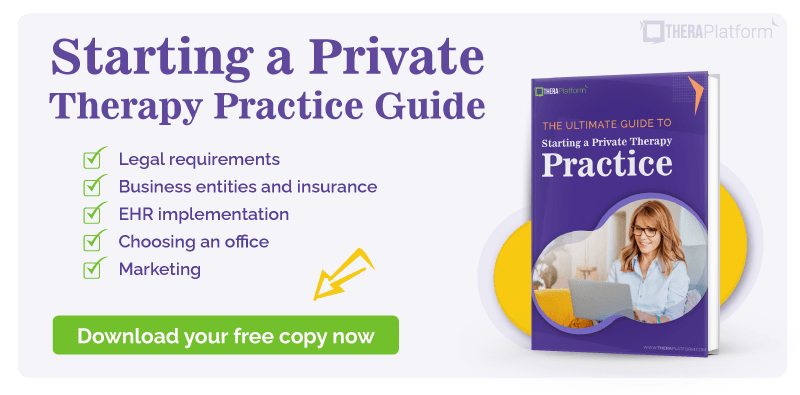How to get started as a private practice dietitian

Beginning a private practice as a dietitian may seem like a daunting task. Whether you are a newly registered dietitian or have spent the past few years working for someone else, creating your own practice can provoke considerable anxiety. You may feel like you know a lot about nutrition but your training probably did not include much about developing a business. You are likely asking, “what are the steps and where to begin?” Here is what you need to know to start your private practice as a dietitian.
Know your audience
The first item of business is to determine your consumer. In other words, who is your target customer? Do you want to be a jack-of-all-trades or focus on a particular specialty? One way to build a business as a dietitian is to find a niche. For example, maybe you want to focus on gut health or treating eating disorders. Or maybe you might want to concentrate primarily on athletes or women. There are loads of possibilities.
And don’t think you have to decide all of this on day one. You might find a niche after seeing whoever comes to you for the first six months to a year. Just make sure you are located in an area that can support your target customer. For instance, you may not want to market your practice for corporate executives if you live in rural Arkansas.
What services will I offer?
Most dietitians go into private practice envisioning the classic one-on-one nutrition care sessions. And while there is nothing wrong with that, there are a lot of other ways to reach consumers (and make money).
As a dietitian, you have the flexibility to explore multiple business streams. These may include traditional individual counseling, as well as group sessions, freelance writing, nutrition courses, and recipes. People want the expertise you can offer. You can reach them in many different ways.
You can always offer your services a la carte but it is also attractive to give the client the option to buy certain packages. For example, sell a bundle of five individual counseling sessions, five group sessions, and a recipe for less than what they would cost individually. This not only saves the client some money but also keeps them involved and interested in your practice over the long haul.
Should I go virtual?
The short answer is yes. Although coronavirus fears might have hastened the use of telehealth, it is here to stay. That is good news for dietitians. There is something to be said for the value of the in-person session but you can reach more people and increase convenience with virtual services. The online world allows us to disseminate information in numerous ways, including virtual counseling sessions, digital resources (e.g., e-books), webinars, and subscription services (e.g., live Q and A’s on a private Facebook group). In the current climate, if you don’t go virtual you will be left behind.
Brand yourself
When you feel like you know the type of customer you are serving and the services you offer, then you can figure out how you want to market yourself. What will you call your practice? What will be your logo? These are the first things that a customer will see when they are contemplating where to go for nutrition services. You need to make a good first impression. It is critical that your name and logo represent what you offer and are also aesthetically pleasing to the client. If you aren’t naturally creative, you may want to visit a site that can help you with your brand. Canva is a site that has templates created specifically for nutrition professionals that can be used for business cards, flyers, handouts, etc.
Internet presence
Another part of your marketing is to establish an internet presence. Maybe a few years ago it was optional to have a website. Now it is mandatory if you expect to succeed. Not only is it your home base for clients, but it can also become a way to make some extra money. The great thing about the nutrition field is that there are a lot of products. Companies will pay you to list their products on your website if you are getting enough site traffic. The best part about it is that you are already using these products in your practice. So why not get paid for it?
Your website is the window to your practice and all it has to offer. You can have a blog to provide information to the masses. You can have links to resources, courses, and the aforementioned products. It is the one place where customers can go to evaluate your services and pay you for your expertise.
You may be wondering how to increase the eyeballs to your website? This can be done through word of mouth but social media is definitely the easiest. Set up professional pages with Facebook, Instagram, Twitter, Linkedin, etc. This helps get the word out and opens up your practice to the widest audience possible. You can also use social media to promote subscription services where you provide information to members. The internet has made it possible to disseminate information like never before. It is up to you to use it to maximize the potential of your nutrition practice. If you feel like you need a little more help, Erica Julson has a website that focuses on online marketing and making money as a dietitian online.

Download free private practice checklist

Insurance or no insurance?
Whether or not to take client insurance is a question that all private practice professionals must face. Dietitians are no exception. The Affordable Care Act (i.e., Obamacare), improved access to preventative services, including more nutrition services. They are covered in many insurance plans, including Medicare and Medicaid, depending on the state. It is important to note, however, that while a registered dietitian can be reimbursed for their services, a nutritionist cannot. Also, remember that taking insurance means you must follow the Health Insurance Portability and Accountability Act (HIPAA) guidelines. It is probably advisable to follow HIPAA anyway, but some have argued that dietitians don’t need to unless they accept insurance.
The benefit of accepting insurance is having access to many more potential clients than you would otherwise. For someone starting a private practice, insurance can be an invaluable resource for obtaining new clients. And if you want to help the most people, insurance is the way to go. Keep in mind that it can take up to a year or more to obtain a full caseload. Insurance can help you get to that point much quicker.
The downside of insurance is that the credentialing process can be arduous and it is frankly a pain in the butt to manage claims. You also may not receive as much money as you would from people that pay out-of-pocket. As a result, some dietitians hire people to help them manage insurance and business issues. Krista Ulatowski, a registered dietitian, wrote a great article on the advantages and challenges of accepting insurance as a nutrition professional. It is worth a read if you are struggling with the decision as to whether or not to accept insurance.

Liability insurance
One insurance you definitely do need as a dietitian is liability insurance. Nutrition professionals often are recommending supplements and different treatments and you want to be covered in the case of something going wrong. HPSO and proliability both offer liability insurance specifically for nutritionist practitioners.
Your dietitian practice is a business
You may think of your practice as a place to help people with their nutrition needs, but it is also a business. As such, you need to designate your practice as either a Limited Liability Company (LLC) or an S corporation. These are similar entities but they have slightly different tax applications. For more information, here is an in-depth article on the pros and cons of each. Some states also require private practice dietitians to get a business license. You can look here to see if your state is one of them.
There are also a lot of other details that must be considered when you open a business as a dietitian. For example, how are you going to schedule clients? How are you going to keep notes? How will you bill clients and what will you use to collect payments? Luckily, there are internet-based companies that have developed practice management software that can act as a one-stop platform for dietitians. One of these is Theraplatform. Foremost, Theraplatform allows dietitians to have secure HIPAA compliant virtual sessions with clients. Additionally, it makes documentation, billing, and using insurance easy for nutrition professionals.
The Academy of Nutrition and Dietetics has a tremendous website that provides useful resources for the business side of the private practice dietitian. Still, all of these details can become overwhelming for someone not trained in business. It is not uncommon for private practice professionals to pay someone else to handle the minutiae of billing and insurance. Time is money; you will have to decide if the time spent tending to business is worth doing it on your own.
Start 30-day Free Trial and explore TheraPlatform. HIPAA Compliant Video and Practice Management Software for Therapists.
Professional development
Once you are set up, you actually have to provide your services and maintain your clientele. Registered dietitians don’t get much training in counseling other people even though personal nutrition care is one of the primary parts of most dietitians’ practice. It might be worth getting a little training as a professional coach so you are more effective in working with your clients. You don’t have to go through all the hours to become a certified coach (although you could) but taking a course or two couldn’t hurt.
Networking with other nutrition experts is one of the most crucial things you can do when starting a private practice. It helps you with your professional development as well as your mental health. Not to mention how those contacts can assist you in obtaining new referrals.
The Academy of Nutrition and Dietetics has several practice groups that can help serve as peer supervisors and give you feedback and support. One of these is for Nutrition Entrepreneurs and offers numerous resources, as well as meetings and networking opportunities. Another is The Dietitians in Integrative and Functional Medicine (DIFM), which consists of over 4000 Registered Dietitian Nutritionists (RDNs), Dietetic Technicians, Registered (DTRs), and dietetic students who share an interest in an integrated and holistic approach to nutrition and health.
Resources for dietitians starting a private practice
• Jennifer McGurk runs a website dedicated to dietitians starting a private practice. Pursuing Private Practice has paid courses and other resources, along with a related podcast for all the information you would ever need to start your own practice.
• Welcome to the REBELution: 7 Steps to the Nutrition Counseling Practice of Your Dreams is written by three registered dietitians who have years of experience in private practice. It covers all the areas of importance, including billing, insurance, and social media. It also provides tips you can only get from people who have been in your shoes.
• Another valuable book on the subject is Making Nutrition Your Business: Private Practice and Beyond, also written by two registered dietitians. It discusses money management and marketing ideas to grow your practice into a profitable business.
Starting a private practice as a dietitian is a challenging task. But it is also highly rewarding. By following some practical steps—and using the numerous tools available—it can be accomplished without too much angst. If you are a dietitian that’s thinking about opening a private practice, or just want help with managing your practice, you can take the TheraPlatform practice management software for a test drive. TheraPlatform, an all-in-one EHR, practice management and teletherapy tool was built for therapists to help them save time on admin tasks. Why not make life easier for yourself and your practice more efficient? Just sign up for a 30-day free trial today. No credit card information is required.
More resources
- Therapy resources and worksheets
- Therapy private practice courses
- Ultimate teletherapy ebook
- The Ultimate Insurance Billing Guide for Therapists
- The Ultimate Guide to Starting a Private Therapy Practice




